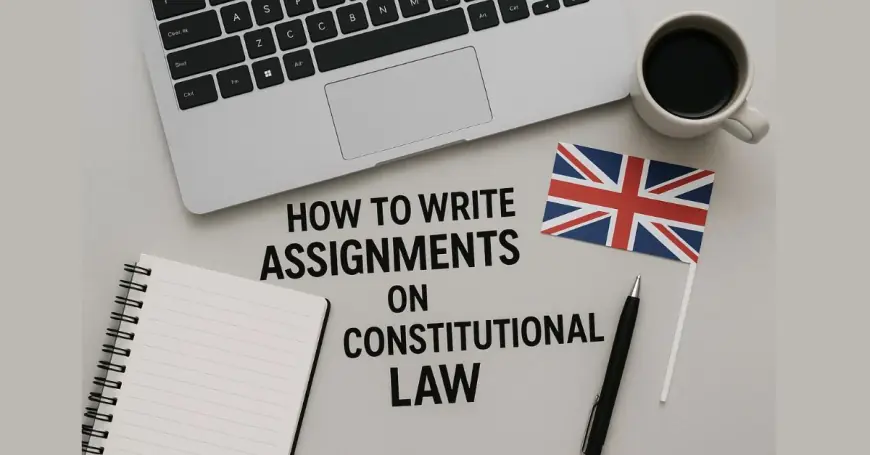How to Write Assignments on UK Constitutional Law
UK constitutional law is a core subject. Assessment help tips for students to analyse cases, statutes, and legal principles effectively.

The UK is one of the most attractive and complex areas of study for students of constitutional law law. Unlike countries with a single coded constitution, the United Kingdom operates under an uncontrolled system, attracting authority from law, case law, conferences and constitutional principles. Writing assignments in this subject often requires rapid analytical skills, significant thinking and ability to balance legal rights with educational debate.
For many students, it can feel heavy to understand how essay, case study or problem questions in constitutional law. This is the place where structured guidance and when necessary, professional assessment aid can create a real difference. In this article, we detect practical strategies for writing effective assignments on UK Constitutional Law, while also highlight how students in need for support to help assist UK services to promote their educational performance.
UK to understand the nature of constitutional law
Before dealing with assignments, students must understand the basic principles of the constitutional structure of the UK:
Unwritten Constitution: UK does not have a single written document, but depends on law, general laws, conferences and official functions.
Parliamentary Sovereignty: Parliament is the supreme legal right, capable of implementing or canceling any law.
Rules of law: No one is above the law to ensure fairness and accountability.
Separation of powers: Although less rigorous, UK maintains different roles for legislature, executive and judiciary than the American system.
Devolution: The powers are distributed to Scotland, Wales and Northern Ireland, giving layers of complexity.
Human Rights Act 1998: Including European Convention (ECR) on human rights in domestic law affects constitutional interpretation.
An assignment in this subject often needs to find out how these principles interact in behavior, especially when new political developments (such as Brexit) or constitutional boundaries are re -shaped in historical cases.
Key Types of Constitutional Law Assignments
Assignments in this subject usually fall into three categories:
-
Essay Questions
-
Require students to critically evaluate legal doctrines or constitutional debates.
-
Example: “Discuss the extent to which parliamentary sovereignty remains the central principle of the UK constitution after the Human Rights Act 1998.”
-
-
Problem Questions
-
Present hypothetical scenarios requiring legal analysis.
-
Example: A new government refuses to publish certain reports. Does this breach principles of accountability under the UK constitution?
-
-
Case Studies
-
Involve in-depth analysis of significant cases such as R (Miller) v Secretary of State for Exiting the EU (2017).
-
Understanding the expectations for each type of assignment is essential. Students who struggle to distinguish between descriptive writing and analytical writing often benefit from structured Assessment Help services that model effective approaches.
Step-by-step guide to write a strong constitutional law assignment
1. Read the question carefully
Many students lose marks as they fail to identify the exact focus of the question. Highlight major words like "seriously evaluation," "discussion," or "analysis". Each word means a specific approach.
2. Research well
Use a combination of:
Primary Source: Law (eg, Bill of Rights 1689, Human Rights Act 1998), Case Law, and Media.
Secondary source: Comment from textbooks, law magazines, and constitutional scholars.
UK-specific sources such as public law journal or the writing of scholars such as A.V. Dice provides educational depth.
3. Clear your answer to the structure
A strong assignment usually follows this structure:
Introduction: Define the subject and determine your argument.
Main Body: Analyze the principles, case law and debate.
Conclusions: Combine the conclusions briefly and present a logical decision.
Students struggling can seek help in evaluation to learn the outline of the law essays.
4. Balance details and analysis
Just stating what parliamentary sovereignty is, will not score high marks. Instead, students should evaluate how it operates today, refer to the challenges created by the European Union laws, deviations and human rights acts.
5. Use case law effectively
The case law is central for constitutional law assignment. For example:
R (Jackson) V Attorney General (2005) displays judicial approach to parliamentary sovereignty.
R (Miller) V Prime Minister (2019) shows the role of judicial review in maintaining accountability.
Always explain legal theory and its broad constitutional implications.
6. Engage with Academic Debate
Citing scholarly views shows critical engagement. For example, debates around whether the UK should adopt a codified constitution are rich sources of material for essays.
7. Write in a Clear Academic Style
Avoid informal language. Use precise legal terminology and reference appropriately (e.g., OSCOLA referencing).
8. Proofread and Edit
Check grammar, clarity, and argument flow. Many students improve grades by seeking external Assessment Help for proofreading and feedback.
Common Challenges Students Face
-
Understanding abstract principles: Ideas like parliamentary sovereignty or the rule of law can seem theoretical without concrete examples.
-
Applying law to scenarios: Some students describe the law but fail to apply it to problem questions.
-
Time management: Assignments often require extensive research within strict deadlines.
-
Referencing issues: Incorrect or incomplete citations reduce marks.
Professional Assessment Help UK providers often address these challenges by offering model answers, research guidance, and editing services.
The Role of Assessment Help in UK Constitutional Law
For students aiming to excel, Assessment Help acts as a valuable academic support tool. Services range from personalised guidance to detailed feedback, helping students refine their arguments and structure.
Benefits include:
-
Clarity in Understanding: Breaking down complex legal concepts.
-
Improved Structure: Learning how to write concise introductions and well-developed arguments.
-
Time Efficiency: Saving time through targeted support.
-
Higher Marks: Enhancing quality through professional proofreading and mentoring.
By seeking Assessment Help UK, students can gain confidence in tackling demanding constitutional law assignments while ensuring their work remains original and academically sound.
Tips for Scoring High in Constitutional Law Assignments
-
Stay updated on current political and legal developments.
-
Read judgments carefully, focusing on reasoning rather than just outcomes.
-
Use diagrams or charts to map relationships between constitutional principles.
-
Attend seminars and debates to deepen understanding.
-
Practice past paper questions to improve exam and assignment performance.
Conclusion
Writing assignments on UK constitutional law requires more than remembering methods or cases. Students should demonstrate significant analysis, clarity of idea and association with educational debate. From parliamentary sovereignty to rule of law and human rights, the constitutional structure of the UK continues to develop, causing the subject to both challenging and rewarding.
For students struggling with assessment, clarity, or analysis, assessment may provide a assistance to increase the UK learning consequences, twisting for assistance. Whether through guidance on structuring an essay, a response to the draft, or on proofriding services, assessment is a practical way to achieve educational success.
Constitutional law assignment not only improves grade, but also creates the skills required for future legal practice. By combining independent studies with professional support, students confidently navigate this important field of law.
What's Your Reaction?
 Like
0
Like
0
 Dislike
0
Dislike
0
 Love
0
Love
0
 Funny
0
Funny
0
 Angry
0
Angry
0
 Sad
0
Sad
0
 Wow
0
Wow
0


















































